From when we wake up to when we go to bed, we constantly use smartphones, tablets, computers, and other electronic devices.
While these devices have brought convenience and connectivity into our lives, they also have a potential downside – exposure to harmful rays.
Blue light is high-energy with a shorter wavelength. It has a shorter wave-length because it is emitted by digital screens, LED lighting, and even the sun.
While exposure to natural rays during the day can be beneficial for regulating our circadian rhythm, excessive exposure to artificial rays potentially harms our eyes.
This is where blue light-blocking glasses come to the rescue. These specialized eyeglasses are designed to filter out or block a significant portion of the harmful rays emitted by screens.
By doing so, they not only help protect our eyes from digital eye strain but also promote healthier sleep patterns.
In this article, we’ll dive into the world of blue light-blocking glasses, exploring how they work, their benefits, and how to choose the right pair for your needs.
What Is A Blue Light Glass?
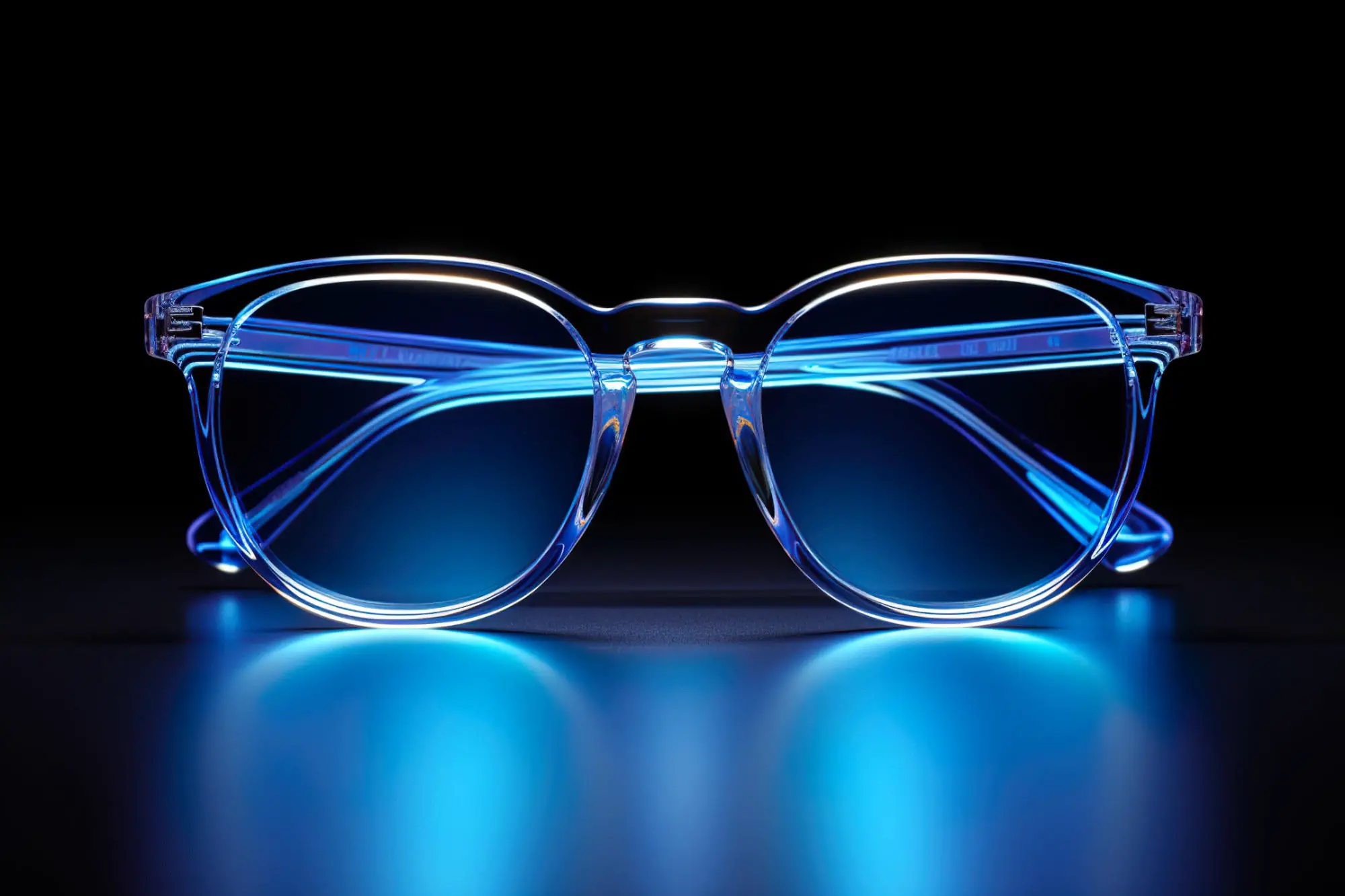
“Blue Light Glass” is not a common or recognized term in the context of eyewear or eye protection. It’s possible you meant “blue light glasses” or “Rayt Blocking Glasses,” which are specialized eyeglasses designed to protect your eyes.
These glasses typically have lenses treated with coatings or filters. These filters reduce the amount of high-energy, short-wavelength rays that reach your eyes.
These glasses can help alleviate digital eye strain, improve sleep quality by reducing the disruption of circadian rhythms, and protect your eyes from potential long-term damage caused by overexposure to blue light.
Do Blue Light Glasses Work?
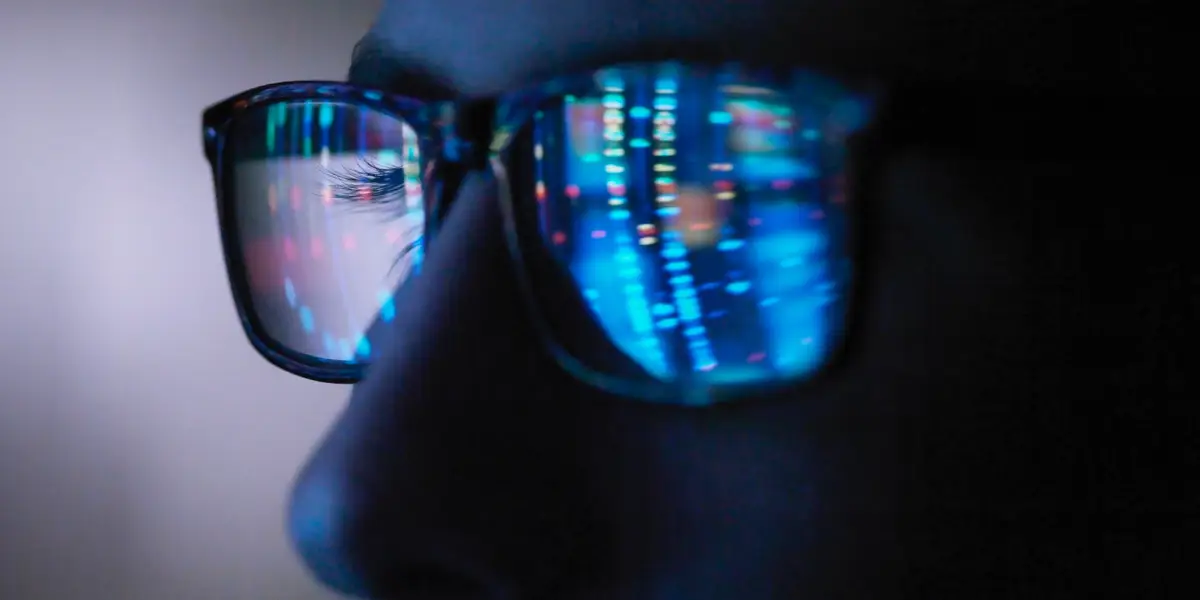
Yes, these glasses do work by reducing the potential negative effects of prolonged exposure to high-energy, short-wavelength rays emitted by digital screens and artificial lighting.
These glasses are equipped with specialized coatings or filters that block or absorb a portion of digital light rays, alleviating digital eye strain, which includes symptoms like –
- Dry eyes
- Eye fatigue
- Headaches
- Blurred vision
They can also help improve sleep quality by minimizing the disruption of circadian rhythms caused by light exposure, making it easier to fall asleep and enhancing overall sleep patterns.
Additionally, these glasses provide an added layer of protection against potential long-term eye damage associated with prolonged exposure to digital light. However, more research is needed in this regard.
While these special glasses are effective, it’s important to pair their use with healthy screen habits for comprehensive eye care.
Benefits Of A Blue Light Glass
The glasses provide several valuable benefits to those who spend significant time in front of digital screens and under artificial lighting:
Reduced Eye Strain
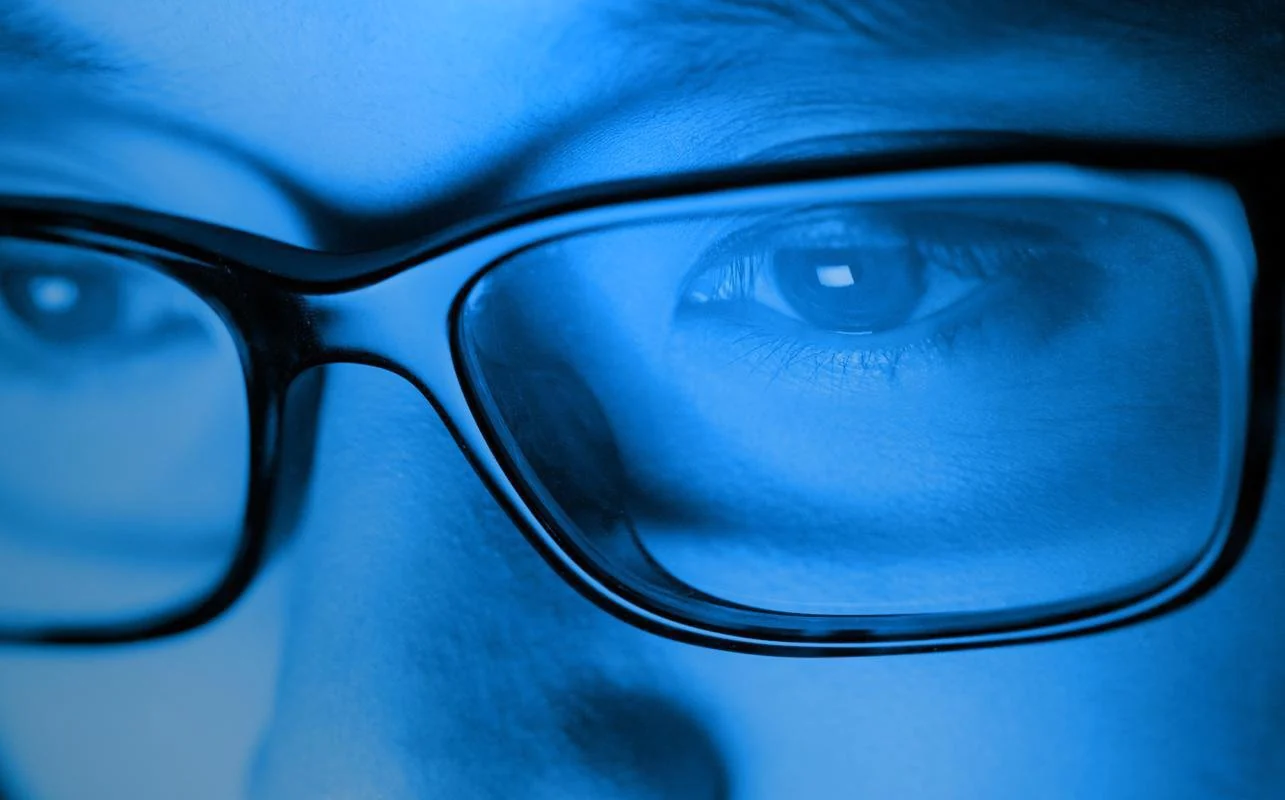
One of the primary advantages of these glasses is their ability to reduce digital eye strain. Excessive screen exposure can lead to symptoms like mentioned above.
Blue light glasses work by filtering out or absorbing the high-energy, short-wavelength digital rays emitted by screens, making it more comfortable to engage with digital devices for extended periods.
Improved Sleep Quality
Exposure to lights from devices, particularly in the evening, can disrupt natural sleep patterns by suppressing the production of melatonin, the hormone that regulates sleep.
The glasses help mitigate this disruption, making it easier to fall asleep and improving the overall quality of sleep.
By wearing them during evening screen use, you can avoid the sleep disturbances caused by excessive ray exposure.
Eye Health Protection
While ongoing research is needed, some studies suggest that excessive exposure to digital light may be linked to an increased risk of eye conditions like macular degeneration.
These glasses act as a protective measure, reducing the potential long-term damage from overexposure to digital light.
Enhanced Productivity
By reducing eye strain and discomfort, these glasses enable users to work more productively during prolonged screen use. Working comfortably for extended periods without experiencing eye strain or fatigue can boost overall productivity.
Versatile Use
These glasses are suitable for individuals of all ages, from students and professionals to seniors. They benefit anyone who wants to safeguard their eyes from the potential negative effects of digital light exposure.
Preventive Health Measure
In an era where screens are ubiquitous in daily life, digital light glasses serve as a proactive health measure. They help individuals maintain their eye health and well-being in a world dominated by digital devices.
Customization
These glasses come in various styles and frame options, allowing users to choose a look that matches their preferences while enjoying the protective benefits of ray-filtering lenses.
Cost-Effective Solution
Compared to other measures to reduce eye strain, such as investing in anti-glare screen protectors or making significant changes to lighting, the glasses offer a cost-effective and easily accessible solution for many individuals.
Are There Any Disadvantages Of Blue Light Glasses?
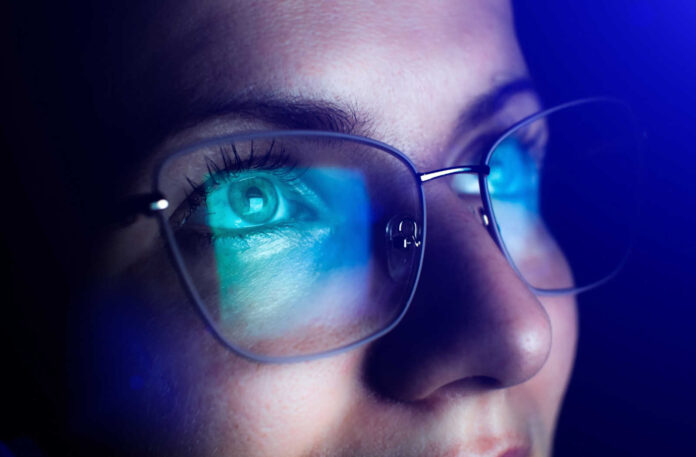
While these glasses offer several advantages, it’s essential to be aware of potential disadvantages or limitations:
Limited Scientific Consensus
While some studies suggest that ray exposure from screens may be associated with eye strain and potential health concerns, there isn’t a complete scientific consensus on the long-term effects of blue light. More research is needed to establish definitive links between blue light exposure and eye conditions.
Effectiveness May Vary
The effectiveness of blue light glasses can vary depending on the quality of the glasses and the specific coatings or filters used. Some low-quality blue light glasses may not offer significant protection.
Overemphasis on Technology
Relying solely on blue light glasses may create a false sense of security. It’s crucial to practice healthy screen habits, such as taking regular breaks and ensuring proper lighting, in conjunction with using blue light glasses.
Fashion Preference
Some individuals may prefer to avoid the appearance of blue light glasses, which can lead to reluctance to wear them consistently. However, there is a wide range of stylish options available.
Cost
While the glasses are generally affordable, high-quality models can be more expensive. This cost might deter some users from investing in them.
Incompatibility with Prescription Lenses
If you require prescription eyeglasses, you may need to choose between ray protection and your corrective lenses. While some brands offer prescription blue light glasses, not all do, and the cost can be higher.
Not a Substitute for Regular Eye Exams
Blue light glasses should not replace regular eye check-ups with an optometrist. Comprehensive eye exams are crucial for monitoring eye health and addressing vision-related issues.
Who Needs Blue Light Glasses?
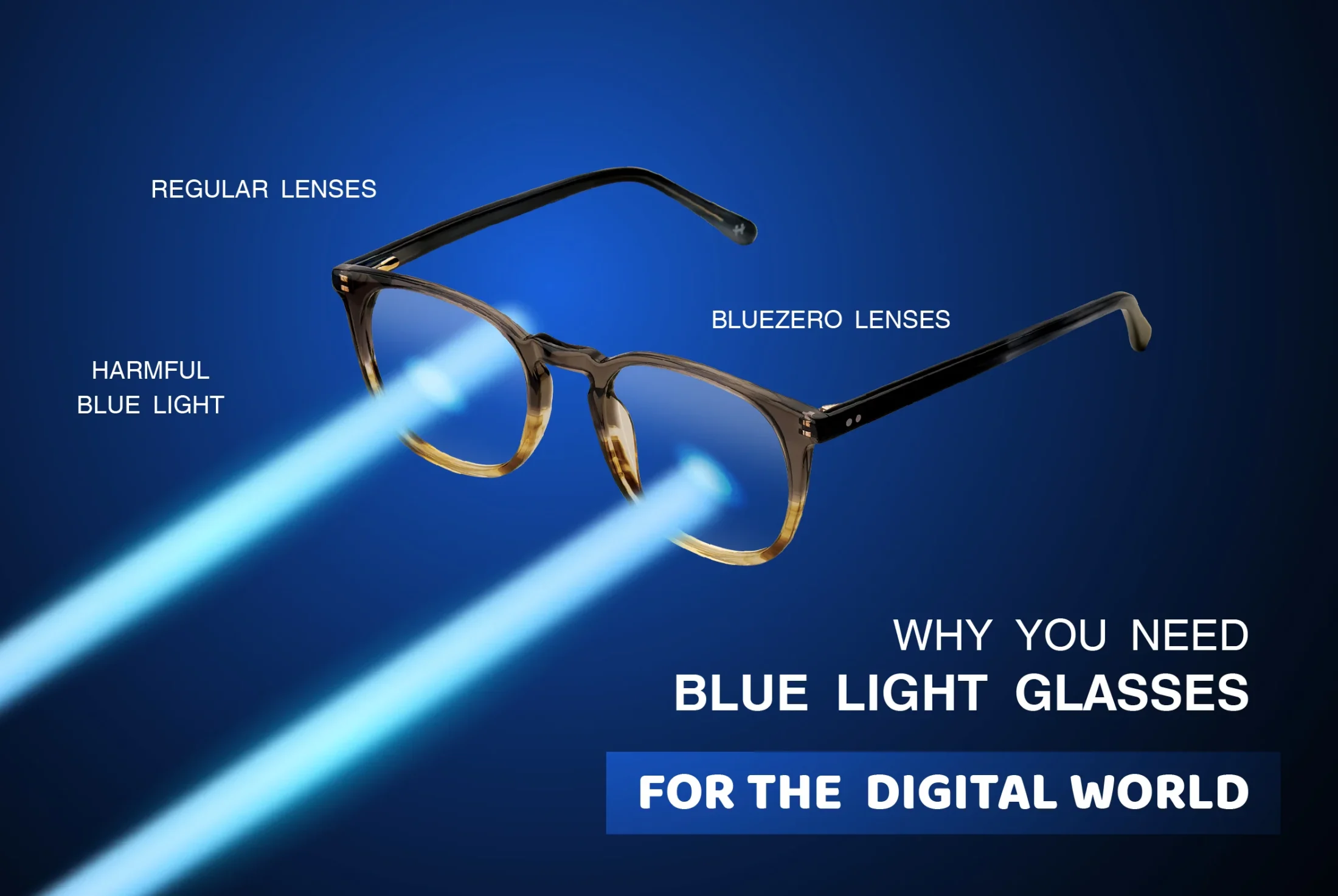
Blue light glasses can benefit many individuals in today’s digitally connected world. Anyone who spends extended periods in front of digital screens, whether for work, study, or leisure, may find these glasses valuable.
This includes professionals, students, gamers, and individuals frequently using smartphones, tablets, and computers.
The glasses are also relevant for those who experience symptoms of digital eye strain, such as dry eyes, eye fatigue, headaches, or blurred vision.
Furthermore, people looking to protect their eyes from potential long-term damage associated with overexposure to rays may benefit from these glasses.
While these glasses are versatile, users need to consider their specific needs and consult an eye care professional if they have concerns about their eye health and screen time.









